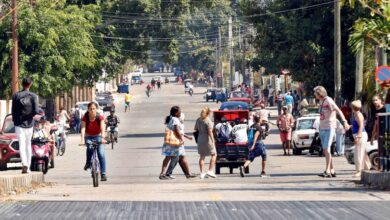In the UN General Assembly different topics were left out
The assassination of leaders in Colombia and the crisis in Argentina, among other short-term issues, had little relevance during the 73rd UN General Assembly
Although the economic, political, humanitarian, and migration crisis in Venezuela is one of the issues that most concerns the international community and Latin America, it is not the only issue on the region.
Leer en español: Lo que no se dijo de Latinoamérica en la Asamblea General de la ONU
The permanent and systematic murder of social leaders in Colombia; the economic crisis that Argentina is experiencing; the violence and war of the drug cartels in Mexico; the repression, authoritarianism, and censorship exercised by the Nicaraguan government, as well as the questioning of the government of Honduras, are issues that, although they deserved to be debated in the General Assembly of the United Nations, went unnoticed.
Without ignoring the seriousness of what happens in Venezuela, it is necessary to question why this issue was given such relevance, when what happens in countries like Colombia, Argentina, Mexico and the others mentioned above, is so, or even more serious than what happens in Venezuela, considering the context and circumstances in which the problems of these countries are currently developing.
In Colombia, the murder of social leaders is on the rise
In spite of the fact that in his intervention before the General Assembly of the United Nations he spoke about peace, the increase of illicit crops, and the fight against corruption, the president of Colombia, Iván Duque, did not say anything about the systematicity and the increase of the crimes against social leaders and defenders of Human Rights. The situation has been denounced by several social and non-governmental organizations, as well as by opposition parties, as reported by the FM radio station.
On the contrary, President Duque, like the majority of Latin American leaders, made special emphasis to talk about the crisis in Venezuela, subtracting value and importance from the seriousness of what is happening on his own country and the failures of the Colombian government and the State itself have been to counteract and face this situation.
Argentina, the crisis increases
President Mauricio Macri was no stranger to the topic of Venezuela during his speech at the General Assembly of the United Nations. Macri is one of the Latin American presidents who announced a joint lawsuit against Venezuela before the International Criminal Court and one of the leaders who constantly questions the government of Nicolás Maduro. What it is contradictory is that his country is experiencing one of the worst economic crises in its history, which has resulted on strikes, mass demonstrations, and a growing general discontent in Argentine.
Also read: Why do Argentines protest against the agreement of the International Monetary Fund?
Given the lack of capacity that has had as a leader to deal with the crisis , Macri expressed at the UN that his country "is going through a period of profound changes", without specifying in the decisions taken by him and that have influenced the worsening of that crisis, but speaking vehemently about the situation in Venezuela.
The role of the UN in Latin America
Through the Human Rights Council, the United Nations issued a resolution requesting Venezuela to allow access to humanitarian aid, something that is absolutely necessary and pertinent given the seriousness of the situation there. However, even with the difficult situations experienced by countries such as Colombia and Argentina, among others, the UN has not had an even similar initiative to support these countries, intervene,e and help them solve their own problems.
We have to consider that beyond Venezuela there are other situations of extreme gravity that require the action of the UN and other organizations, for example, that the region where there are more most forced disappearances (according to the UN), is Latin American. We must not forget that, as it happens in Venezuela, there are countries with serious humanitarian problems and violations of Human Rights.
LatinAmerican Post | Samuel Augusto Gallego Suárez
Translated from “Lo que no se dijo de Latinoamérica en la Asamblea General de la ONU”
* The opinion of the editor does not represent this newspaper
Listen this article






